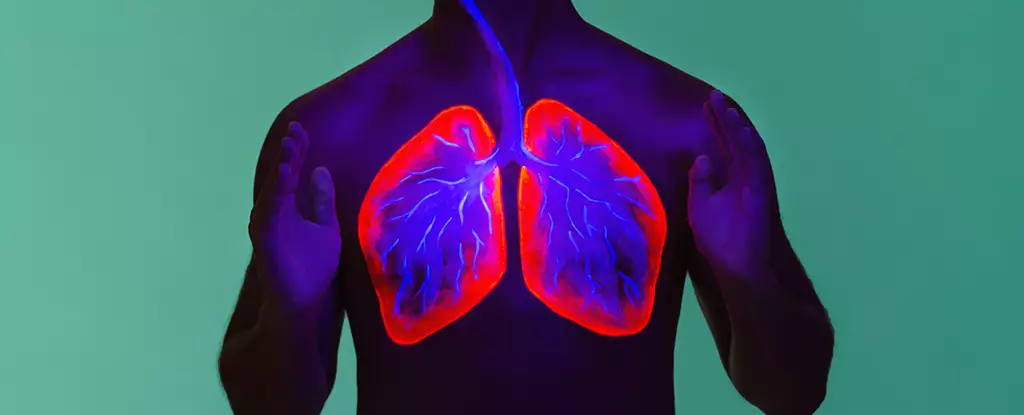For many, lung cancer conjures images of heavy smoking and polluted air, but groundbreaking research from the University of Florida and the University of Kentucky is redirecting that narrative. It reveals that the foods we consume may significantly influence our risk of developing lung cancer, particularly lung adenocarcinoma, which accounts for a staggering 40% of lung cancers globally. The molecule at the heart of this emerging dialogue is glycogen—a substance most commonly associated with energy storage in our muscles. The captivating findings indicate that glycogen levels in lung tissue could be a harbinger of cancer progression.
Glycogen’s role in this context appears to be dual-faceted. Indeed, it functions as a critical energy reserve, but it also seems to provide an environment conducive to rapid tumor growth when its levels are increased. In a series of experiments conducted on mice, researchers found that when glycogen was abundant, the cancer grew at an alarming rate. Conversely, the depletion of glycogen levels seemed to stifle tumor growth. This delineation presents an unprecedented perspective on how metabolic processes might incentivize cancer cell proliferation, shifting the focus from traditional carcinogenic factors to metabolic ones.
The Science Behind the Discovery
The research hinges on a technique known as spatial metabolomics, which is designed to pinpoint small molecular characteristics within the confines of specific tissues. This advanced methodology enables scientists to visualize molecular phenomena with a clarity that was previously unattainable. As Ramon Sun, a molecular biologist involved in the study, elegantly articulates, this platform acts as a powerful lens through which the labyrinthine interactions of diseases can be understood. Given its ability to unveil elusive molecular patterns, spatial metabolomics could be pivotal in shaping the future of cancer research.
The implications of this study are far-reaching. Glycogen appears to serve as fuel for cancer cells, providing a plentiful energy source sourced directly from carbohydrate-heavy diets. More intriguingly, the researchers observed a pronounced increase in lung cancer development among mice fed high-carb, high-fat diets compared to those on a controlled regimen. This type of dietary approach may lay bare a hidden connection that warrants serious consideration and exploration in human populations.
Diet as a Potential Cancer Catalyst
Although more research is necessary to solidify the connection between diet and lung cancer risk in humans, preliminary findings suggest a noteworthy association worth our attention. For decades, the societal understanding of lung cancer has largely overlooked the potential implications of a Western-style diet, traditionally viewed as the realm of liver or pancreatic cancers. The assertion that lung cancer may also be influenced by dietary habits forces a reevaluation of how we perceive cancer risk factors, and it highlights the urgent need for nutritional consciousness.
Public health campaigns have long focused on smoking cessation as a primary avenue for reducing lung cancer rates. Yet, if food choices also play a considerable role in this disease, it begs the question: shouldn’t our public health messaging encompass dietary awareness as well? Sun advocates for a shift in strategy, emphasizing that behavioral change related to diet may become as crucial as anti-smoking campaigns have been in the fight against lung cancer.
The Road Ahead: Rethinking Prevention Strategies
The nuanced understanding of glycogen’s association with lung adenocarcinoma brings us face-to-face with a critical junction in preventive healthcare. As we stand on the brink of what could be a paradigm shift in our approach to combating cancer, it’s vital that policymakers and health educators take heed. Just as the tides have turned in how we view the direct impacts of smoking, we must now engage in a similar transformation regarding our perceptions of diet.
Emphasizing healthier eating patterns not only optimizes overall health but may also mitigate the escalating burden of lung cancer. The correlation between elevated glycogen levels and particular lung cancer types is a clarion call to both scientists and the general public alike. The necessity for widespread awareness and proactive nutritional strategies is more pronounced than ever. Our dietary choices, once deemed tangential to lung cancer, now demand a place in the limelight, urging us to take immediate and informed action.
Embracing this paradigm could ultimately pave the way for a healthier society, reducing not just lung cancer rates but fostering a culture of wellness that prioritizes what we consume as a pillar of health.


Leave a Reply